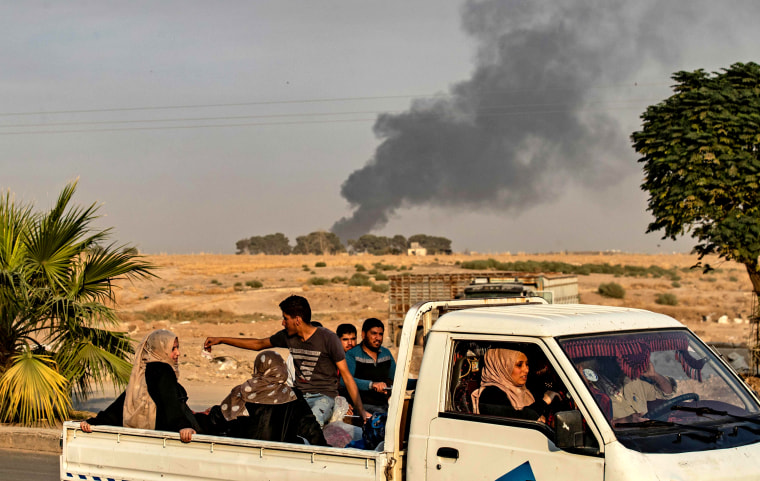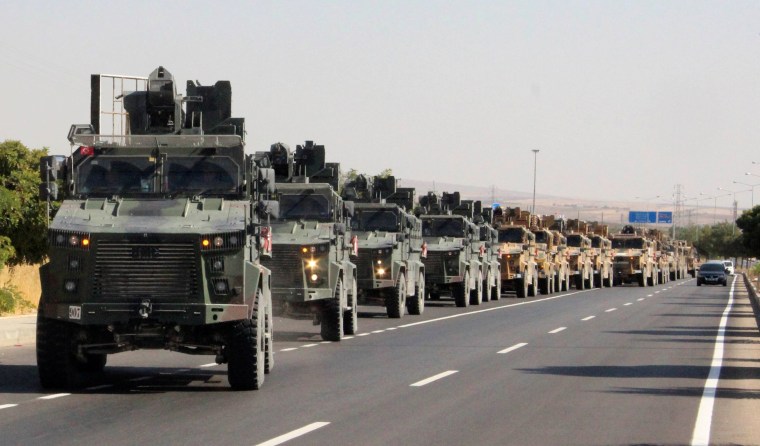Turkey launched airstrikes in northeastern Syria on Wednesday, Kurdish militia leaders and eyewitnesses said, prompting panic among civilians in the region and despair among the fighters who have been crucial U.S. allies in the war on the Islamic State militant group.
The announcement came three days after President Donald Trump agreed to move American troops out of the region to clear the way for Ankara.
"The Turkish Armed Forces, together with the Syrian National Army, just launched Operation Peace Spring," Turkish President Recep Tayyip Erdogan tweeted. "Our mission is to prevent the creation of a terror corridor across our southern border, and to bring peace to the area."
Late Wednesday evening, Turkey's Ministry of Defense said in a post on Twitter that the Turkish Armed Forces and the Syrian National Army had launched a "land operation into the east of the Euphrates" river as part of the military operation.
Minutes before Erdogan’s statement, Turkish jets began pounding suspected positions of Syrian Kurdish forces in the town of Ras al Ayn, The Associated Press reported.
"There is a huge panic among people in the region," said Mustafa Bali, a spokesman for the Kurdish-led Syrian Democratic Forces, or SDF, which has been working alongside around 1,000 Americans to defeat and contain ISIS.

There were signs of panic in the streets of Ras al Ayn — one of the towns close to the borders — after the attacks began, according to the AP. Near Qamishli, plumes of smoke were seen rising from an area close to the border after activists reported sounds of explosions nearby.
"A wave of displacement" had started across the northeast of Syria, the SDF said in a statement.
U.S. Ambassador to Turkey David Satterfield was summoned to the Turkish Foreign Ministry on Tuesday, where he was informed around 4 p.m. local time of Turkey’s pending incursion into Syria, according to a U.S. official with knowledge. At that time the offensive had already begun.
Satterfield told them to reconsider the decision, reiterating the negative consequences for Turkey and informed the Turkish officials that if they decided to proceed anyway, they must avoid any harm to U.S. military and civilians present in the area, as well as Syrian civilians and civilian infrastructure.
Earlier Wednesday, the Kurdistan 24 news channel posted footage and stills of what it said were cars streaming out of the predominantly Kurdish town of Serekaniye as Turkish warplanes began shelling the area.
NBC News could not independently confirm the airstrikes and other SDF accounts, but pictures from the area showed civilians fleeing as smoke billowed in the background, and Turkish television broadcast video of warplanes taking off from military bases.
Turkey maintains it is trying to secure its borders and wipe out "terrorists" and will eventually seek the return of Syrians to their country, millions of whom have fled the civil war. The Kurds, however, say the operation is mainly aimed at crushing them.

The Syrian Democratic Forces are led by the Kurdish People's Protection Units (YPG), which has long angered the Turkish government and Erdogan. Turkey views the YPG an extension of the separatist Kurdistan Workers’ Party, which is considered a terrorist group by the United States.
Kurdish commanders and fighters say they feel betrayed by their erstwhile allies.
“The SDF showed good faith to the security mechanism agreement between the U.S. and Turkey. This left our people defenseless,” the SDF tweeted on its official account.
The group has also called for a no-fly zone over the area, similar to what the U.S. did in Iraq to protect Kurdish communities from Saddam Hussein’s crackdown in 1991.
Sen. Lindsey Graham, R-S.C., a fierce Trump loyalist, urged the president to change course.
"Pray for our Kurdish allies who have been shamelessly abandoned by the Trump Administration. This move ensures the reemergence of ISIS," he tweeted.
In a statement earlier Wednesday, the SDF called on the international community and all countries in the international coalition against ISIS to “carry out their responsibilities and avoid a possible impending humanitarian disaster."
"This attack will spill the blood of thousands of innocent civilians because our border areas are overcrowded," it said.
According to multiple current and former U.S. officials, the White House's announcement Sunday blindsided not just America's Kurdish partners but almost everyone — senior officials at the Pentagon, the State Department and the White House, lawmakers on Capitol Hill, and U.S. allies in Europe and the Middle East.
On Monday, Trump warned in a tweet that if Turkey — a longtime American ally with NATO's second-largest standing army — did anything that he considered to be "off limits," he would "totally destroy and obliterate" its economy.